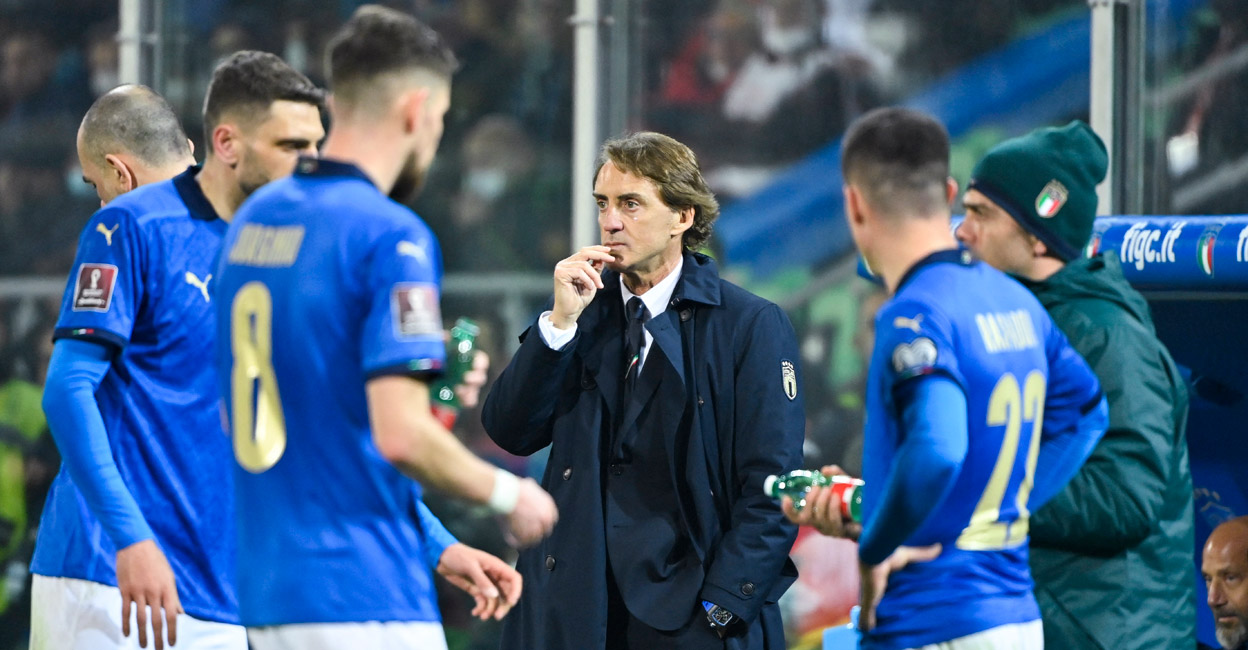Italy was a fixture at the men’s World Cup for six decades, qualifying for soccer’s premier tournament without fail and winning its third and fourth titles. It established itself as one of the sport’s giants, culturally and competitively. It built a flourishing domestic league and a feared national team that seemed impervious to colossal failure.
And yet, on Thursday in Palermo, that team failed to qualify for its second consecutive World Cup.
It lost to North Macedonia, a former Yugoslav republic that has never qualified, and until this year never even came close. Aleksandar Trajkovski scored a stoppage-time goal to sink the Italians. His teammates spilled onto the field as an entire nation of 60 million emulated the Italian players, their hands on heads, their psyches stunned.
The 1-0 defeat eliminated Italy from the European playoffs, just as a loss to Sweden had four years ago. But that failure hadn’t been entirely unforeseen. That Italian team had stumbled through a qualifying group that included Spain, and succumbed to an eventual World Cup quarterfinalist. It promised to never let this happen again.
This one, just eight months ago, had won a European championship. It looked like a World Cup contender, a giant awoken from a slumber. It had Lorenzo Insigne, a magician, and Federico Chiesa, a relentless winger on the other side. It had Jorginho, the world’s pre-eminent conductor, and a rock-solid back line. It had Gianluigi Donnarumma, a sprawling shot-stopper, and more.
They conceded just once in their first six qualifiers. Their plans for Qatar were in place. They entered November with margin for error in Europe’s final qualifying window. A win over Switzerland at home, in Rome, at the vaunted Stadio Olimpico, would confirm those plans.
But it was there, on Nov. 12, that everything began to unravel. Jorginho missed a 90th-minute penalty that would have clinched qualification. Italy settled for a draw with the Swiss. It entered the final day of group play knowing that a win over Northern Ireland would likely be sufficient, but then couldn’t find a goal. Frustration simmered. Nerves tightened.
Switzerland won its match that day and sent the Italians to the playoffs. A semi-random draw put them on a collision course with Portugal. The last two European champions would meet head-to-head in a playoff final; one would go to the World Cup, the other wouldn’t.
But Italy never got there.
First, it had to beat lowly North Macedonia — population 2 million, GDP one-150th of Italy’s.
On Thursday, it couldn’t.
It bossed the game. It took 32 shots to North Macedonia’s four, and 16 corners to North Macedonia’s zero. It stared at gaping nets, but couldn’t hit them.
It created chance after chance, and induced roar after roar from 30,000 people in Sicily.
It converted none, and those roars became moans. The 30,000 became antsy.
Their fear, for much of the second half, was that the Italians had run out of ideas; that a 0-0 deadlock would not be broken; that extra time would come and go, and that a terrifyingly random penalty shootout would determine World Cup survival.
But again, Italy never got there. Trajkovski latched onto a second ball. His bounding bullet caught Donnarumma flat-footed.
It flew past the Italian keeper, and players employed by clubs in Cyprus, Saudi Arabia, Slovakia, Romania and Moldova flew toward their goal-scoring hero, who himself plays for a Saudi club at a 7,000-seat stadium.
Players employed by clubs like PSG, Chelsea, Juventus and Inter Milan tugged their jerseys over their faces, and shoved heads into hands.
Hundreds of traveling Macedonian fans thrusts fists into the sky and waved flags rapturously. Thousands of Italians booed and whistled. Donnarumma stared at the turf. Emerson Palmieri lay on it. Jorginho shook his head. Marco Verratti wiped away tears. Some fans surveyed the scene, distantly, their butts stuck to seats, their faces shellshocked.
The eldest among them had witnessed 14 consecutive men’s World Cup appearances, eight semifinals and four titles dating back to the tournament’s pre-World War beginnings.
As they stood still, paralyzed by anguish and disbelief, they confronted the unthinkable: That Italy, mighty Italy, will go 12 whole years without seeing a men’s World Cup.
“It’s a nightmare,” Verratti said postgame. “We had the players to challenge for the tournament [title], yet here we are talking about a disaster.”
Jorginho, who’d missed two costly penalties in group play, said they would “haunt me for the rest of my life.”
Last summer’s European title run had been “the most wonderful experience of my life,” head coach Roberto Mancini said. “This was the biggest disappointment.”



